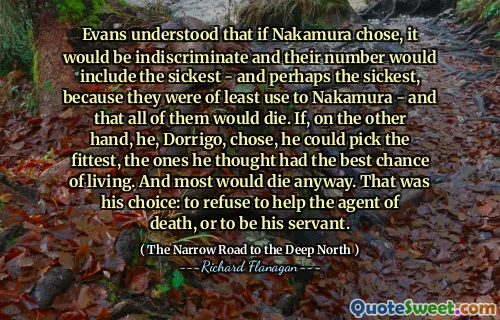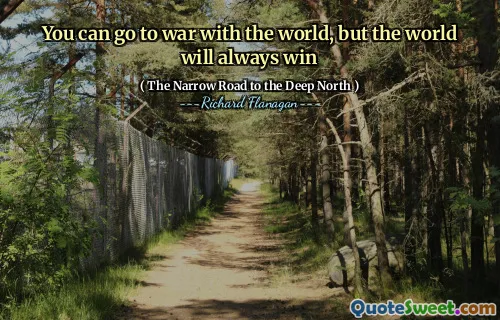
Evans understood that if Nakamura chose, it would be indiscriminate and their number would include the sickest - and perhaps the sickest, because they were of least use to Nakamura - and that all of them would die. If, on the other hand, he, Dorrigo, chose, he could pick the fittest, the ones he thought had the best chance of living. And most would die anyway. That was his choice: to refuse to help the agent of death, or to be his servant.
📖 Richard Flanagan
This profound excerpt delves into the critical moral dilemma faced by Dorrigo and other characters entangled in a brutal reality where life and death are manipulated by those in power. It vividly illustrates the moral weight of choice amidst chaos—seeing the contrast between Nakamura’s potentially brutal, indiscriminate approach and Dorrigo’s moral stand to select and preserve the fittest, despite knowing that survival odds remain slim. The quote encapsulates the difficult terrain of compassion, utilitarian ethics, and resistance against dehumanization. It challenges the reader to reflect on the inherent responsibility in decision-making when lives are at stake. The moral decision to refuse participation in a system that values utility over humanity underscores the conundrum of personal integrity versus survival pressure. This tension is amplified in wartime or oppressive regimes, where the veneer of necessity can justify atrocities. The idea of choosing to act ethically, to not become an agent of death, highlights the importance of moral agency—recognizing that even in the most dire circumstances, individuals possess the power, and perhaps the duty, to choose compassion over cruelty. This moral stand is a testament to individual conscience amidst systemic evil, resonating with timeless themes of resistance and moral courage. Ultimately, the quote prompts readers to consider their own standpoints when faced with difficult ethical choices—will they conform to unjust systems, or will they risk personal sacrifice to uphold their moral values?







